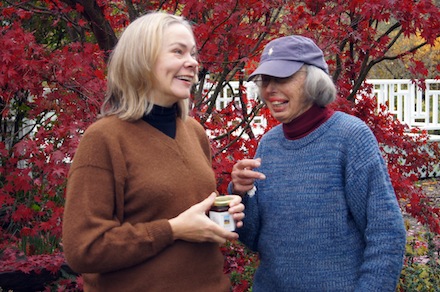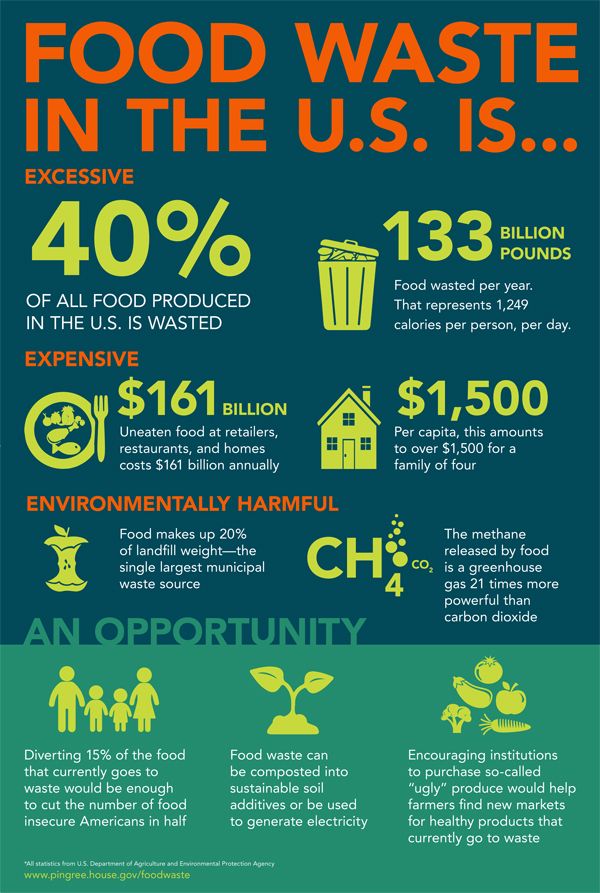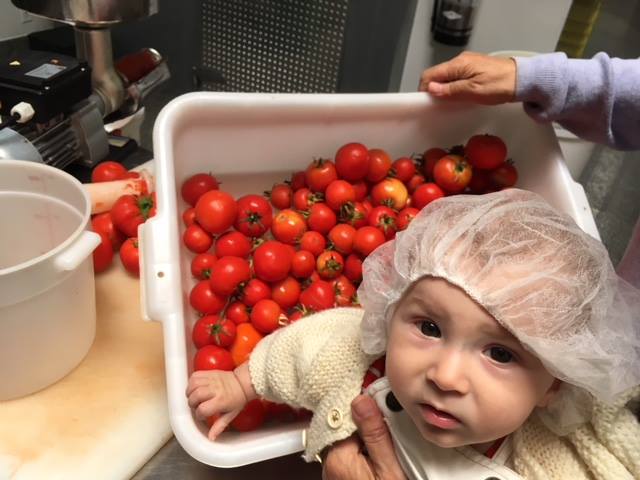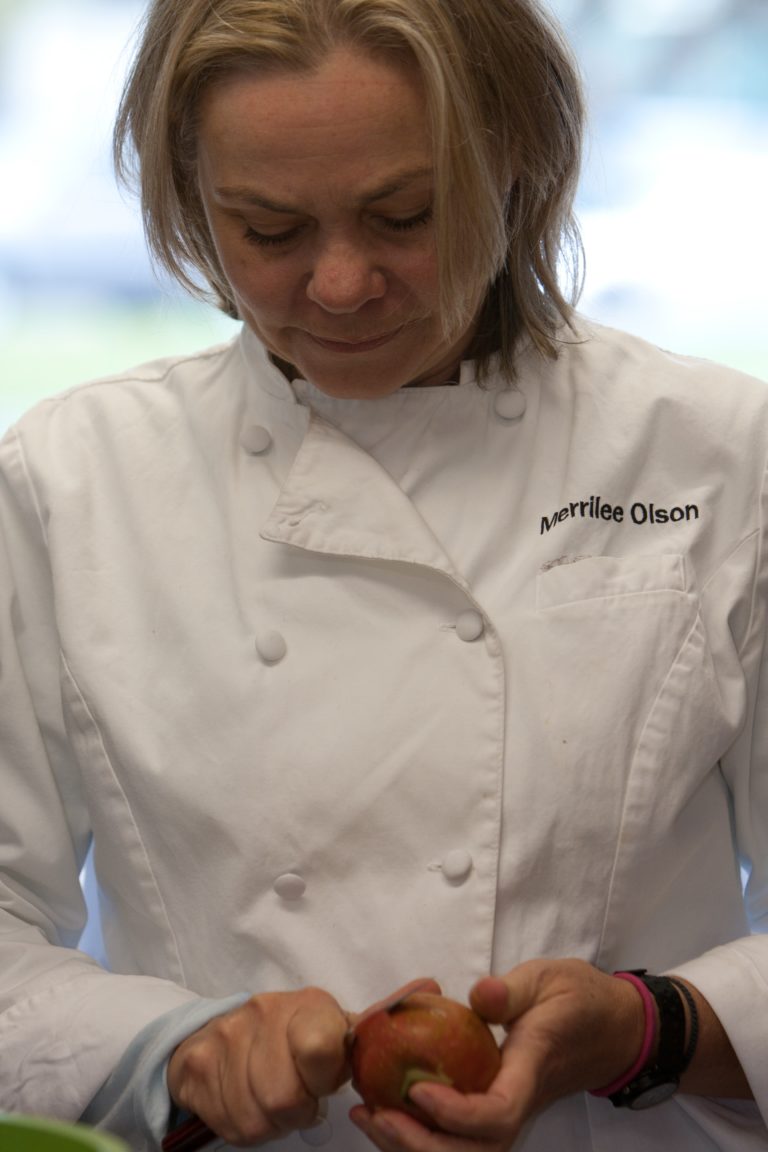P101: Preserving Produce and the Planet one jar at a time
Preserve Farm Kitchens
- By Tiffani Patton
One woman's quest to transform potential food waste into award-winning jams and sauces.
On a sunny day over a picnic-style lunch of fried chicken, salads, and chocolate mousse (the only items missing were the gingham blanket and picnic basket), Merrilee Olsen, owner and founder of Preserve Farm Kitchens, Theo Ferguson, and I talked food waste, women in business, and what being a part of the Slow Money community is all about.
One day, Merrilee was buying her favorite strawberries from her favorite vendor, Nancy, at the farmers’ market. The market day was ending, but a few flats of strawberries were still left. Merrilee asked after the fate of the strawberries, and was shocked to discover they were on their way to the compost. Merrilee asked if she could turn them into jam, Nancy said yes, and Preserve Farm Kitchens was born.

Merrilee Olsen (L) and Nancy Skall (R) with a jar of award-winning strawberry jam.
Composting usable, but conventionally unmarketable produce is not something that is unique to Nancy. It happens to most, if not all, producers and contributes heavily to the food waste problem. (Food waste is such an issue that John Oliver even did a segment on it.)
In this case, Merrilee saw that food was wasted post-harvest, and farmers lacked the time and resources to change that.
Preserve Farm Kitchens helps farmers preserve the whole harvest, reduce food waste, and ultimately bolster their incomes.
It sounds like a win-win, right? For Slow Money investors, it was, but not everyone is a Slow Money investor.

Food waste happens along every part of the food chain. Approximately 40% of the food produced in the U.S. is wasted.
Even with a glaring need and a solid business plan, securing funding was difficult. It wasn’t just hard for Merrilee; this is the case for most women entrepreneurs. In the United States, women make up over one-third of business owners, yet receive only 16% of small business loans and a measly 7% of venture capital funding. Women not only receive fewer loans, but the size of their loans are much smaller. Last year, the average size of a business loan for male entrepreneurs was $156,297. The average size business loan for a female entrepreneur was $57,097.
Against the odds (aka the patriarchy) – women entrepreneurs run 30% of all small businesses, employ 7.9 million people, and generate over 1.4 trillion in sales. For Merrilee, becoming a part of the Slow Money community was crucial to succeeding. Being a part of Slow Money helped bridge the gendered funding gap: “Slow Money brought in a number of investors, including Theo: my biggest investor and supporter, my fairy godmother.” What does a fairy godmother mean in this case? An ally with the business acumen and industry experience to give sage advice, an ally who goes to bat for your success not just to get a return, but to make the world a better place.

Theo Ferguson and Merrilee Olson
But it is more than providing a fairy godmother — Slow Money provides credibility to women entrepreneurs that aren’t typically available to them in the mainstream funding world. By bringing people and opportunities together to invest locally, in mission-driven opportunities, Slow Money provides a platform for those who are marginalized in the in-between, in the to, to shine.
the change that needs to happen
in the world of investment.
Slow Money investors care about building a better world, not getting that hockey-stick growth that is so sought-after in the funding world often to the detriment of people and planet. And, according to Merrilee, “that desire to build a better world is the change that needs to happen in the world of investment.”
The result? A growing business that helps to make regional food systems more resilient, and a workplace where she and her business partner can bring their full selves to the job, because “what women need is to bring our lives and our spirit, our whole self, into business and not have to compartmentalize stuff.”
Without the ability to bring the whole self into work, Preserve Farm Kitchens would never have had the pleasure of working with George, their “youngest intern ever.” George, born prematurely, spent nearly every day in the Preserve Farm Kitchens office, and kitchen, until recently.

Lance Olsen, who is developmentally differently-abled, spends a few weeks each summer with Preserve Farm Kitchens, prepping tomatoes for canning.

We dare you to show us a younger (and cuter) intern.
Want to be a visionary investor?
What makes Slow Money special, according to Merrilee is that it “attracts visionary investors who are willing to work with you over and over again because they’ve got their eye on the mission.” It provides a network of investors, a community of mission-driven people, opportunities to create a more resilient food system, and, if you’re fortunate, you might even get, or become, a fairy godmother.
Want to be a visionary investor? Remember the “to” in farm to table. Invest in the to. Invest in women.
And the strawberry jam that started it all? It won a Good Food award.
About Preserve Farm Kitchens
Preserve Farm Kitchen supports small, local farms by utilizing the whole harvest to make gourmet food products. To achieve this, they fill the infrastructure void with right-size processing kitchens, then partner with small family farms to directly source local ingredients. The result is local, fair-trade, sustainable products that customers love. Look for their products here.

Merrilee Olson, Founder of Preserve Farm Kitchens.
